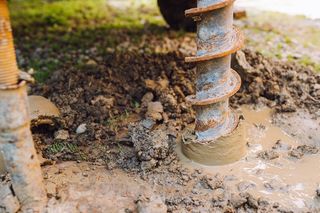What is a borehole and how is one different to a well?
Most boreholes are drilled deep into an aquifer and will last a lifetime and longer — plus they're ideal for living off grid

The vast majority of properties are linked to the UK's water network, so most renovators never need to wonder 'what is a borehole?'.
But a borehole can be an invaluable asset on a self-build project by providing an off-grid water supply at around 20,000 litres a day without the need for a licence.
To put that into perspective, the average home only uses about 350 litres per day.
What is a borehole?
A borehole is a narrow shaft which is drilled into the ground. It is used for extracting resources such as water, gas, or petroleum extraction. These holes are also dug as part of geotechnical or environmental investigations in order to take samples.
高达70%的我们的水龙头出来的水is recycled wastewater that has been treated with chlorine and fluoride. Most water pumped directly from the ground by a borehole is protected by rock and soil and only needs a simple filtration system to make it potable.
A submersible water pump is used to extract the water from the bottom of the borehole and bring it to the surface. These pumps are typically electrically operated. If you have an artesian well, the groundwater is under pressure and flows out naturally without a pump.
Property expert Gregory Smith atPriceYourJob.co.uksays a borehole is a sustainable source of water that is replenished by natural percolation of rain and flooding from the surface. He adds: "It is an ecologically sound way to obtain water that has been in use for thousands of years and eases pressure on mains water supplies."
Can you drink water from a borehole?
Boreholes typically access water at a deeper depth than a well. This water has passed through many layers of rock and soil, which filters out a lot of contaminants.
When the water is pumped to the surface of the borehole it goes through a filtration process. On occasion chemicals may be used depending on the quality of the water supply. For the most part water from a borehole is of a higher quality than well water and mains water.
Any water that is destined for human or animal consumption must be safe. This is why the water from a borehole will be analysed to determine its quality and an appropriate filtration or sterilisation system will be put in place.
What is the difference between a borehole and a dug well?
Boreholes and wells are both sources of water from underground but differ in their depth and width.
A borehole is a very narrow shaft that is drilled deep into the ground, in this instance to extract water. In contrast, a well is wider and shallower, particularly if it is dug by hand. Wells may be many feet in diameter whereas a borehole will only be inches across.
The top of the well extends above ground and uses either an electric or hand pump, or a pulley rope and bucket to extract the water. A borehole needs a pump to bring the water to the surface as it is too narrow and deep for manual extraction.
Gregory says most wells and boreholes are lined with brick, concrete or PVC to prevent them caving in and to keep out contaminants. Some formations of borehole are self-supporting such as those in chalk or sandstone and so are unlined.
One of the advantages of a borehole over a well is that it can be drilled to a greater depth. This gives access to deeper supplies of water which are unlikely to run dry in drought conditions.

Do boreholes run out of water?
Most boreholes are drilled deep into an aquifer and will last a lifetime and longer. It would take many years of severe drought for a borehole to run out of water. As wells are dug to a shallower depth, they are more likely to dry up in times of drought, which can be a problem for off grid properties.
As most borehole pumps are electric, if there is a power cut you will be unable to bring the water to the surface. For these situations, it is a good idea to have a back-up power supply such as a petrol or diesel generator.
What are the problems with boreholes?
Boreholes are not without their problems. Inappropriate siting of the borehole can cause issues, this is why a proper survey of the site must be carried out that takes into consideration the location, geology and proximity to possible contaminants such as animal or human waste.
Poor construction or low-quality materials can also cause a borehole to fail. Not drilling deeply enough can result in a borehole drying out in a drought while cutting costs on a pump may cause it to wear out too quickly.
Regular maintenance is necessary to ensure that the vital working parts of your borehole and pump are kept in good working order. Elements that wear out should be replaced when needed and checked annually.
How much do boreholes cost to install?
The cost to drill a borehole is mostly calculated by its depth. Drilling costs around £100-£140 per metre while the pump, controls, chamber and wellhead will add approximately £3,000.
考虑到这些成本,一个20米钻孔cost around £6,000 while a 70 metre borehole may run to about £14,000.
If the water is for domestic consumption rather than agricultural use such as land or crop irrigation, filtration units will need to be added. This may increase the cost by between £1,500-£3,000 but it will depend on the size of your household.
You also need to consider the running cost for the electric pump as well as replacing consumables such as filters.
Get the Homebuilding & Renovating Newsletter
Bring your dream home to life with expert advice, how-to guides and design inspiration, direct to your inbox.
Sam is based in Coventry and has been a news reporter for nearly 20 years. His work has featured in the Mirror, The Sun, MailOnline, the Independent, and news outlets throughout the world. As a copywriter, he has written for clients as diverse as Saint-Gobain, Michelin, Halfords Autocentre, Great British Heating, and Irwin Industrial Tools. During the pandemic, he converted a van into a mini-camper and is currently planning to convert his shed into an office and Star Wars shrine.

